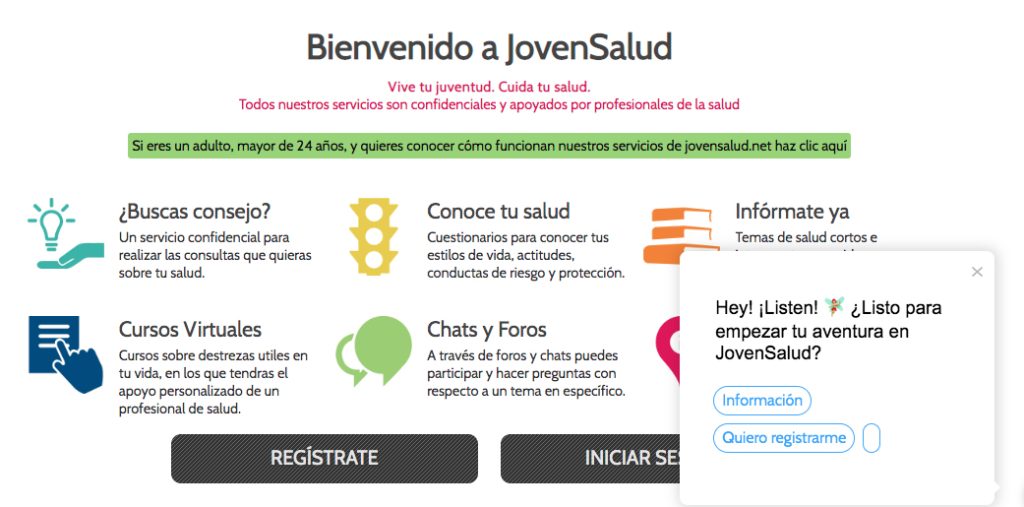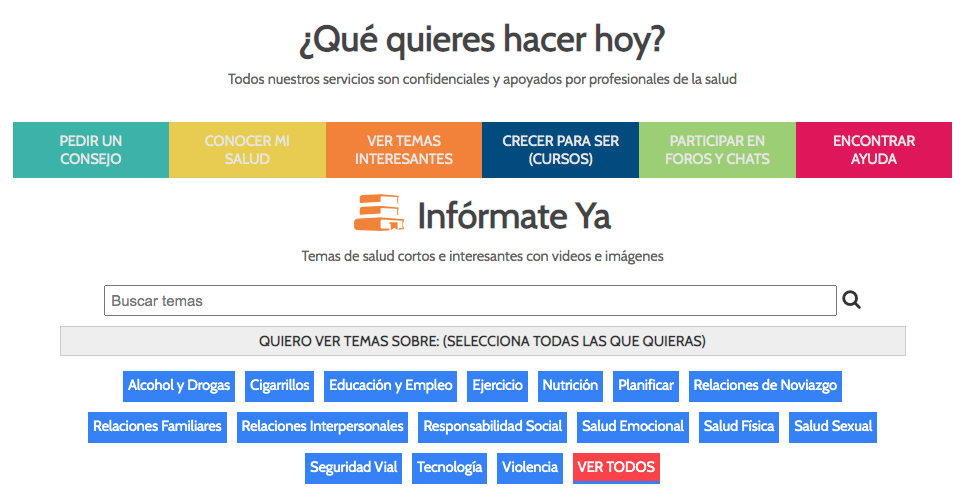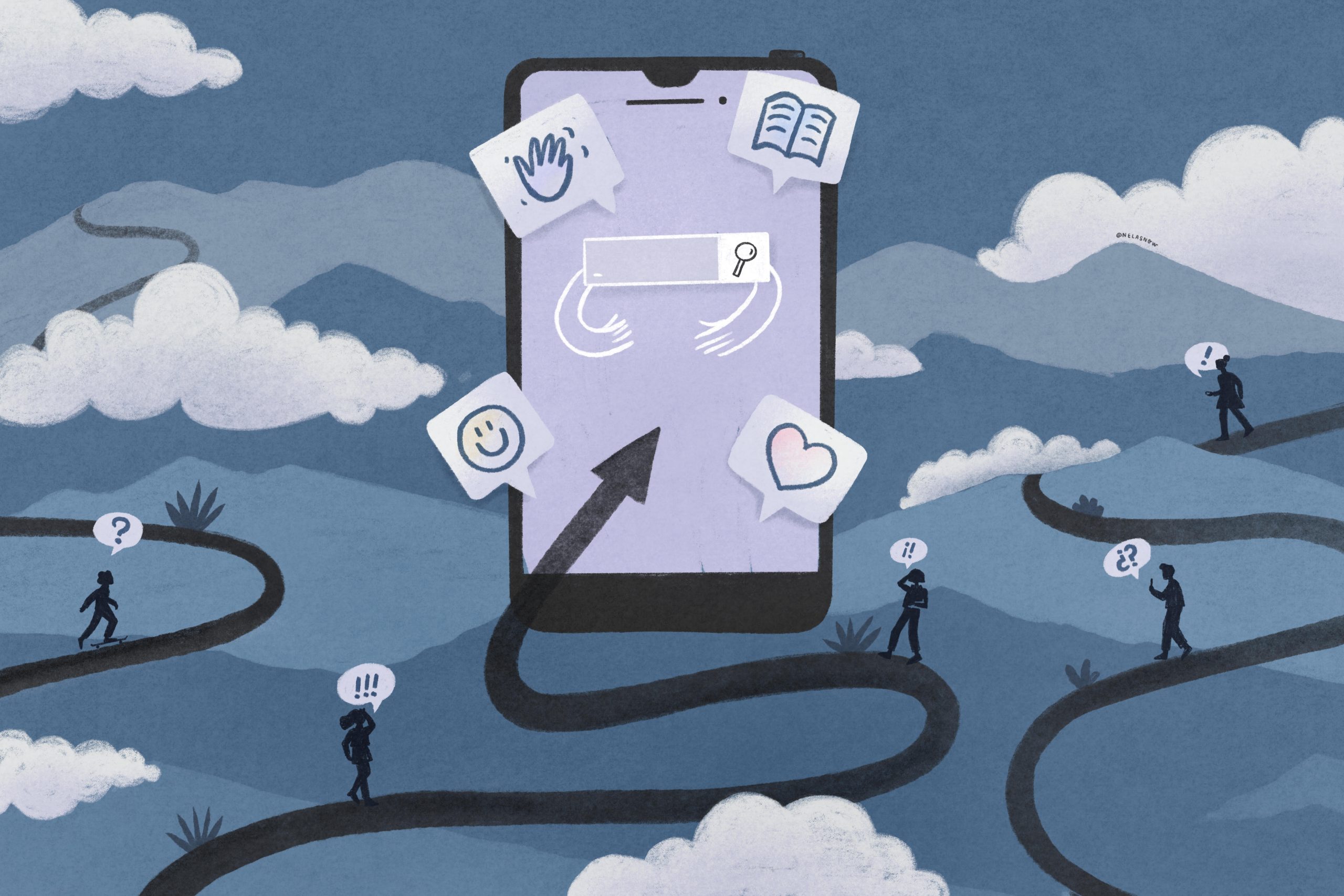“We thought it was a fantasy at the beginning, but now we’ve had results,” says Juan José Hernández, counselor at the San Rafael de Platanares de Pérez Zeledón Technical Professional College (CTP).
He’s talking about the JovenSalud platform, created by the nonprofit organization TeenSmart International (TSI). In 2016, along with another teacher from his school, Juan José traveled from Perez Zeledón to Ciudad Neilly, two cities in southern Costa Rica separated by more than 130 km, to participate in training on this project. He says that they headed back to school afterwards with a concern.
“When we came back, we were thinking, ‘Oh, more work! Oh, more stuff! How are we going to tell our boss that we got ourselves into something new, and unpaid?” Juan Jose says. “But one thing is to do, and another is to have tools to do it with. That is the difference”.
JovenSalud is a digital platform (website and mobile application) designed so that young people between the ages of 10 and 24 can access information and support. The goal? “For young people to recognize that each of the decisions they make is based on information, on their life skills, and that they can make positive decisions—but that each decision they make is going to affect their life in the present or in the future,” says Joyce Corrales, Training, Orientation and Public Relations Coordinator for TSI.
“Sometimes people say ‘Oh, I have so much to do. How do I do it? What do I do it with?’” says Juan José. “Having tools that assess, train, and direct students in a better way—with that, [JovenSalud] is facilitating our work, and we have seen it in action here.”
This is how the CTP of Platanares became an ally of JovenSalud and TSI, one of the more than 130 active alliances that the organization has today with all kinds of institutions and organizations in Latin America.
The “Philosophy” section of the TeenSmart profile states: “Adolescents with access to information, support, and life skills can develop self-leadership, healthy behaviors, and internal motivations that will position them on a path of success in school, work, and life… Adolescents are capable of making the best decisions for their lives when they have adequate support and information.”
But how does TSI apply this philosophy to a digital platform? What impact has it had youth and their physical and mental health?

Addressing high-risk situations
“We work on prevention. We don’t provide therapy: it’s support,” explains Mariana Harnecker, director of the TSI Platform and Educational Content Department.
JovenSalud is a space where young people can seek information and advice. However, all the people interviewed emphasize that it is not a space for therapy, but rather a place where young people and the institutions that work with them can recognize and address high-risk situations.
“We do not give therapy,” reiterates Mariana, “but we use many elements of psychology. As counselors we help you think, to question what your values are, what your life goals are. How you can take responsibility for your own life and be more proactive. We encourage you to make your own decisions, and we trust you to be the best in your life.”
To get young people onto the free platform, TSI has fostered alliances with a large number of institutions and civil society organizations to promote its use among youth.
Joyce indicates that these organizations include “churches, schools, colleges, health institutions, dance groups, music groups, any group that has young people between the ages of 10-24.” These make up the more than 130 active alliances of TSI.
However, in 2021, during the pandemic, TSI decided to change the way it approaches young people so that more can find them and participate without the need for an institutional link. That year, more than 18,000 new young people registered on the platform from all the countries of Central America and Mexico where TSI works. That’s 134% more than in 2020.
In Costa Rica, 3,735 new users were registered in 2021, of which 76% came to the platform entirely on their own.
However, alliances with institutions remain vital. One that’s essential is the relationship that TSI has developed with the Health Areas of the Costa Rican Social Security Fund, or Caja.
Kimberly Matarrita McCallan is the psychologist of the Matina Health Area, in Limón. Although she has been with the institution for a short time, she has been able to experience the impact of JovenSalud on the young population of Limón. For her, the platform has provided continuity to her work.
“It prevents [behaviors[, but it also promotes,” says Kimberly. “If a person started sexual relations and it didn’t happen in the best way, he or she can enter JovenSalud and learn about self-care. While it’s preventive, it is also part of the cure.”
The tools of JovenSalud
Although TSI was created in 2004 by the Costa Rican-U.S. citizen Cathy Strachan, it was not until 2010 that the JovenSalud digital platform materialized. Today, the platform includes self-assessment questionnaires; self-paced online courses; comprehensive health information and resources in a virtual library; and professional guidance, provided one-on-one and through online forums.
The most recent innovation are the micromessage interventions to which the user can subscribe through the mobile application. The young person who uses the platform can access what they want and when they want, but the content has also been adapted for three age groups, 10 to 13 years old, 14 to 17 years old, and 18 to 24 years old.
As Joyce explains, the self-administered questionnaires are the first service of the “banquet of services” that the platform offers to young people.
“There, they get immediate results,” she says. “They can realize how they are doing in different areas and take action. Generally in adolescence, one is in good health but you could have alerts in other areas: for example, family communication or bullying. The important thing is that young people can have this valuable information to make decisions.”
The platform also offers seven online courses on topics related to family relationships; risk behaviors such as substance use, nutrition, sexual and reproductive health; violence prevention; and mental health issues. Each of these courses has a series of short modules, and at the end the young people receive a certificate.

For the CTP in Platanares, self-administered questionnaires and online courses have become part of the school’s curriculum. Every year until the pandemic and starting again in 2022, seventh-year students receive an induction from the teaching staff that includes completing the self-administered questionnaires and later, during the school year, taking the courses as part of the Spanish curriculum. For this, students have access to the school’s computer lab so they can access the platform.
Juan José says that in 2021, a CTP student decided to take one of the courses on her own. This was a surprise for the faculty, but an indication that the program continues to resonate with students.
“We were left thinking that we sinned by omission of not having informed the student population that they could take the courses on their own,” says Juan José.
Another service offered by the platform is “Looking for advice,” a space where young users can ask about any topic and receive a response in less than 24 hours. This service is staffed by a series of professional volunteers—health professionals, psychologists, even nutritionists—who have been trained by TSI to answer young people’s questions.
“It is primary care, support, listening”, explains Joyce. “It is a service that seeks to promote critical thinking, to find the best decisions for their lives. To help them feel supported.”
Kimberly, the psychologist for the entire canton of Matina, has found support in the platform’s virtual library. She explains that she always recommends that her young patients use the tool to find reliable information, especially on topics that they may not want to address with her, or that they didn’t have time to address during their in-person appointment.
Joyce explains that the virtual library offers more than 100 information nodes that are quick and easy to access and review. Mariana says that many of these nodes are a summary or synthesis of the information that is presented in the virtual courses.
“It is a public resource, because there is no need to create an account”, adds Mariana. “These are very direct, practical, simple articles that provide information or more skills to deal with different situations. For example, strategies such as: what to do when I go to a party and I don’t want to drink?”
“It is an essential support tool for adolescents,” says Kimberly, “especially because the Caja’s services are fast, brief. Teens need support at all times. JovenSalud provides that support after the consultation and the therapeutic process.”
Between data and people
An online platform will always lack the benefit of human-to-human interaction. It’s no secret that more robust educational programs and in-person clinical care are needed to address youth’s physical and mental health issues. However, part of what JovenSalud offers is the data it generates about the experiences of young people in Central America and Mexico—data that can help health care providers and educators implement programs and actions with an additional impact.
For institutions such as the CTP of Platanares or the Matina Health Area, this data allows them to plan strategies to be more effective in their communities.
How does it work? The young users of JovenSalud create user profiles where they can indicate where they live and whether they belong to an institution such as the CTP. The individual information that young people enter when they participate in the questionnaires, courses or the consultation service is confidential, and the comments or recommendations generated by the platform are seen only by them. However, allied institutions can receive a summary of the trends of their populations.
The Platanares CTP has used this tool rigorously with its new students.
“For us, it’s a tool to tell you ‘Look, they’re fine,’ or ‘Be careful, they’re in danger’”, says Juan José. “But it also shows us areas for improvement throughout the year, to work on with the students. For them to succeed and stay in school, we need students to be well, to feel well. It’s not only meeting their basic needs, but ensuring well-being.”
For Juan José, the ability to know and understand his students has allowed him to improve one of the most important pain points of any school.
“About eight years ago, we had an 18% annual dropout rate. Around 160-180 students were leaving our classrooms,” says Juan José. “Today, because of this program and others we have, we only have one student who dropped out [in the past year]. That fills us with pride, because it means that all those grains of sand are bearing fruit. Seeing that we came from a population where 160-180 students dropped out, where it seemed that there was no empathy towards the institution, now we see students who support each other, who know and who appreciate the institution.”
The information compiled by JovenSalud has allowed the CTP—and many other institutions—to plan activities that will really have an impact on risk behaviors in their community. For example, when analyzing the information, the CTP organized driver’s ed activities that addressed the importance of using safety devices, since JovenSalud helped them detect that one of the risk factors of the student population was the illegal use of vehicles.
“In my case, drug use has surprised me,” says Kimberly about the information she has been able to analyze from her canton using JovenSalud. “Also the beginning of sexual relations, and consent. There was data there that showed consent was not being obtained. The platform is very preventive, but what I like the most is that if someone opens up and tells [what happened to them], the platform connects them to file the respective complaints.”
“If the user’s life is in danger, we must break confidentiality to seek help for the person, making the referral so that they address the case in the shortest amount of time possible,” explains Mariana.
“There have been times [where that has occurred frequently],” she adds. “Yes, there are many consultations about mental health in general, but not all of them are at risk. There are a lot of [consultations] about depression, because ‘My girlfriend broke up. I don’t know what to do. My life doesn’t make sense anymore.’”
“Over the years we have had alerts of suicidal ideation or situations of possible violence or something at home, through the platform”, says Juan José about the experience of the CTP. “Even if only one case like that is detected through the platform, that makes everything worth it.”
Scaling up
Through its more than 10 years of existence, JovenSalud has amassed more than 100,000 users in Central America and Mexico. However, their goal now is to achieve more than one million users by 2025. That is why measuring the impact of the platform is essential , not only to get the support needed to reach this goal, but also to get youth to want to use the platform and stay on it.
“We measure satisfaction with services,” says Joyce.”We measure impact: youth take a pre- and post-test to see if they report changes in behavior, in knowledge, if their future decisions have changed. This evaluation mechanism that we have on the platform allows us not only to have this data but also to make decisions regarding it.”
“Of the users who enrolled in a course in 2021, 80% finished it. The studies we have done of other companies or platforms that offer virtual courses sometimes do not reach 10%,” adds Joyce .
“We have to see how we can rely on artificial intelligence to be able to respond more immediately to lighter, more generic queries,” says Mariana, when I ask her about the challenges that TSI and JovenSalud at this time. “One thing that young people are claiming a lot is that 24 hours is a long time to wait for an answer. They want an answer now.”
But Joyce brings up another limitation of the program.
“You always have to recognize the digital divide. We have young people who take the course only with prepaid data, so the variables can be diverse. In addition, JovenSalud does not replace 911: we do not provide therapeutic care, but we do provide a listening and support service,” she says, reiterating that the platform’s counseling cannot be confused with psychotherapeutic support.
For Juan José, this support service could grow to take additional forms in the future.
“[TSI] reaches more people online with fewer resources, but the face-to-face impact is always needed,” he says. “I have seen that one limitation could be that there are not enough resources to carry out face-to-face activities where the student body can understand more clearly who TSI is.”
Full disclosure: El Colectivo 506 co-founder Katherine Stanley Obando is a freelance consultant for TeenSmart International. She did not participate in any editorial decisions for this piece, including interviews, reporting, writing, or conceptual editing.





